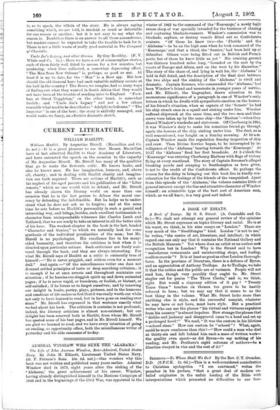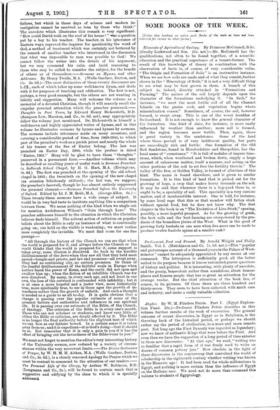Szaaroxs.—To Whom Shall We Go? By the Rev. C. T.
Ovenden, D.D. (S.P.C.K. 2s. 6d.)—This is a well-considered contribution to Christian apologetics. "I am convinced," writes the preacher in his preface, "that a great deal of modern un- belief originates in the unfair loading of the Bible with interpretations which presented no difficulties to our fore- fathers, but which in these days of science and modern in- vestigation cannot be received as true by those who think." The anecdote which illustrates this remark is very significant. "How could David walk on the roof of his house?" was a question put by a boy to his teacher. The teacher, in his ignorance of Eastern ways, reproved the inquirer for questioning the word of God, a method of treatment which was certainly not bettered by the remark of another teacher who intervened in the discussion that what was impossible to man was possible to God ! We cannot follow the writer into the details of his argument, but we may commend his calm and lucid reasoning to those who may be called to consider the subject, for the benefit of others or of themselves.—Sermons on Hymns, and other Addresses. By Henry TwelLs, M.A. (Wells Gardner, Darton, and Co. 35. 6d.)—The most distinctive of these twenty discourses are L-1/C., each of which takes up some well-known hymn, and deals with it for purposes of teaching and edification. The first is not, perhaps, a very good example, but the others are not wanting in felicity and suggestion. Many will welcome the volume as a memorial of a devoted Christian, though it will scarcely recall the singular personal attraction which the preacher possessed.— Thoughts in Past Years, by Edward Henry Bickersteth, D.D. (Sampson Low, Marston, and Co., 3s. 6d. net), may appropriately follow the volume just mentioned. Dr. Bickersteth is himself a well-known and highly appreciated writer of hymns, and in this volume he illustrates sermons by hymns and hymns by sermons. The sermons include utterances made on many occasions, and covering a considerable period of time, from 1869-1900, to which part of the preacher's work as a parish priest and nearly the whole of his tenure of the See of Exeter belong. ,The last was preached on Easter Day, 1900, while the preface is dated "Easter, 1901." Many will be glad to have these "thoughts" preserved in a permanent form.--Another volume which may be described SS recalling years of useful work is Sermons Preached in Sedbergh School Chapel, by H. G. Hart, M.A. (Rivingtons, 35. 6d.) The first was preached at the opening of the old school chapel in 1883; the twentieth on the opening of the new chapel (an occasion felicitously utilised); the last was, we suppose, the preacher's farewell, though he has almost entirely suppressed the personal element. —Sermons Preached before the University of Oxford. Edited by LL J. M. Bebb, M.A. (George Allen. 6s.)— These twenty-three sermons have a wide range of subject. It would be in very bad taste to institute anything like a comparison between them. We mean nothing of the kind when we single out for mention Archdeacon Wilson's "Gain through Loss." The preacher addresses himself to the situation in which the Christian believer finds himself. The solvent action of criticism on popular beliefs about the Bible is only an instance of what is continually going on; our hold on the visible is weakening; we must realise more completely the invisible. We must find room for one fine passage :— " All through the history of the Church we can see that when the world is prepared for it, and always before the Church or the world thinks that the world is prepared for it, some support is Wren away, some illusion is dissolved. Go back to the terrible disillusionment of the Jews when they saw all that they held most sacred—temple and priests, and law and promises—all swept away. They had no continuing city, no certain promises. Or think of the fearful disillusionment of the faithful souls in Europe when Luther faced the power of Rome, and the earth did not open and swallow him up; when the fiction of an infallible Church was for ever dissolved. By many, in every such age, and not least in our own, the loss of the outward is confounded with infidelity; but it is at once a more hopeful and a juster view, more historically true, more spiritually true, to see in these ages the growth of in- wardness rather than the growth of unfaith. And such a thought is needed as a guide to us all to-day. It is quite obvious that a change is passing over the popular estimate of some of the greatest factors and authorities and influences in our spiritual life. It is passing over our estimate of the Bible, of the Church, of theology. The criticism of the Bible is in every one's mouth. Those who are not scholars or students, and know very little of either the Bible or criticism, are deeply affected by it. The Bible is no longer the final authority before the slightest text of which we can bow as our fathers -bowed. In a certain sense it is taken away from us ; and it is expedient—it is God's doing—that it should be so. But remember that it is only a gain to you if it has the effect of bringing out the inwardness of the Bible-voice to you."
We must not forget to mention the editor's very interesting history of the University sermon, now reduced by a variety of circum- stances within the very narrowest limits.—The Divine Ordinance of Prayer, by W. H. M. H. Aitken, M.A. (Wells Gardner, Dayton, and Co., 3s. 6d.), is a closely reasoned Apology for Prayer which we must be content to commend to the attention of our readers.— The Personal Life of the Clergy, by Arthur W. Robinson, B.D. (Longmans and Co., 2s.), will be found to contain much that is suggestive and edifying by the class to which it is specially addressed.







































 Previous page
Previous page